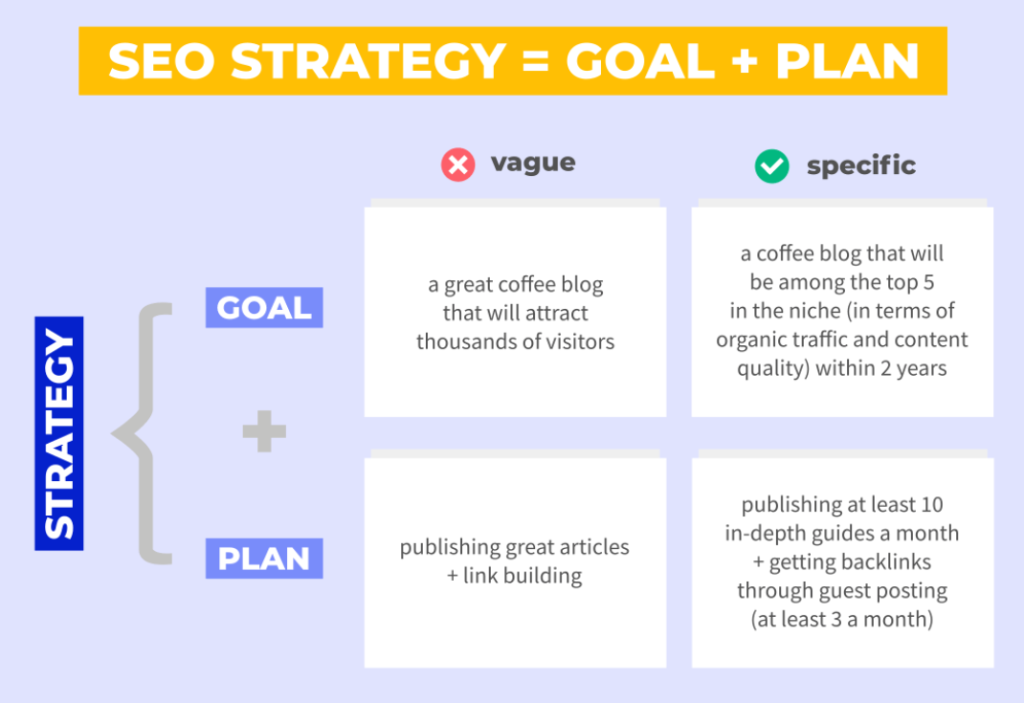Essence of SEO Strategy
SEO, short for Search Engine Optimization, is a digital marketing approach that aims to enhance a website’s visibility on search engine result pages (SERPs). While SEO encompasses various techniques, a central component of this digital marketing strategy is the SEO strategy itself. In this article, we will delve into what SEO strategy is, why it is fundamental, and how it influences the online success of businesses and websites.
Defining SEO Strategy
SEO strategy is the game plan that outlines the actions and steps taken to optimize a website for search engines. It’s a holistic approach that considers various elements, aligning them to achieve higher search engine rankings and improve online visibility. In essence, SEO strategy is the roadmap that guides the optimization process.
The Role of Keywords
Keywords are the foundation of any SEO strategy. These are the search terms or phrases that users type into search engines when looking for information, products, or services. Integrating relevant keywords strategically throughout a website’s content helps search engines understand what the website is about and who its intended audience is. This understanding is critical for search engines to rank a website appropriately in SERPs.
On-Page vs. Off-Page SEO
Another fundamental aspect of SEO strategy is the distinction between on-page and off-page SEO. On-page SEO involves optimizing elements within the website, such as content, meta tags, and site structure. It’s about making sure that your website’s pages are well-structured, informative, and user-friendly. Off-page SEO, on the other hand, focuses on external factors, primarily backlinks. Backlinks are links from other websites to yours, and they play a vital role in demonstrating your website’s authority and trustworthiness to search engines.
SEO Audit and Analysis
Before crafting an effective SEO strategy, it’s essential to conduct an SEO audit and analysis of your website. This process involves assessing your website’s current state, identifying strengths and weaknesses, and understanding your competitors. An SEO audit helps in recognizing what needs improvement and where opportunities lie. Additionally, it ensures that your strategy is tailored to your specific needs and goals.
Building an Effective SEO Strategy
A well-structured SEO strategy begins with a solid foundation. To optimize your website for search engines effectively, it’s crucial to understand the following key components:
Keyword Research
Keyword research is the cornerstone of your SEO strategy. It involves identifying the specific words and phrases that potential visitors to your website might enter into search engines. By understanding these keywords, you can tailor your content to match what your audience is searching for. Effective keyword research involves:
- Identifying relevant and high-traffic keywords.
- Evaluating keyword competitiveness.
- Finding long-tail keywords (more specifically, longer phrases) that are less competitive but highly relevant to your content.
Content Optimization
Once you’ve identified your target keywords, the next step is to optimize your content around them. Content optimization includes:
- Crafting high-quality, informative, and engaging content that addresses the needs and questions of your audience.
- Placing your chosen keywords strategically in your content, including headings, subheadings, and throughout the text.
- Ensuring your content is well-structured and easy to read.
Backlink Building
Backlinks, also known as inbound links, are links from other websites to your site. They are like digital endorsements, signaling to search engines that your content is valuable and authoritative. High-quality backlinks can significantly boost your SEO efforts. To build a robust backlink profile, you should:
- Reach out to authoritative websites within your niche for potential collaborations and guest posting.
- Create shareable, link-worthy content that naturally attracts backlinks.
- Regularly monitor your backlink profile to disavow any toxic or spammy links that might harm your SEO.
Technical SEO
Technical SEO focuses on the technical aspects of your website that impact search engine rankings. It ensures that your website is easily accessible and understandable by search engines. Key elements of technical SEO include:
- Improving website speed and performance.
- Optimizing your site’s mobile-friendliness.
- Structuring URLs, meta tags, and headings in an SEO-friendly manner.
- Creating an XML sitemap and submitting it to search engines.
These steps form the core of building an effective SEO strategy. While they are fundamental, it’s important to note that SEO is an ongoing process. Regularly updating and adapting your strategy is essential to keep up with evolving search engine algorithms and to maintain and improve your rankings.

Measuring and Adapting
Measuring the effectiveness of your SEO strategy is a vital step in the optimization process. It allows you to gauge how well your efforts are performing and identify areas that need improvement. Here are key aspects to consider:
Tracking Performance
Effective measurement starts with the use of web analytics tools like Google Analytics. These tools provide insights into various metrics that help you assess your strategy’s performance. Key metrics to monitor include:
- Organic Traffic: The number of visitors coming to your website through organic (unpaid) search results.
- Keyword Rankings: Tracking your position in search engine results for target keywords.
- Conversion Rates: Measuring the percentage of visitors who complete a desired action, such as making a purchase or signing up for a newsletter.
- Bounce Rate: Assessing the percentage of visitors who navigate away from your site after viewing only one page. A high bounce rate may indicate issues with content quality or user experience.
Adapting to Algorithm Changes
Search engines like Google frequently update their algorithms, which can impact your website’s rankings. Staying informed about these changes and adapting your SEO strategy accordingly is crucial. Here’s how you can adapt to algorithm updates:
- Stay Informed: Regularly follow SEO news and updates to understand algorithm changes.
- Content Quality: Focus on producing high-quality, relevant content that aligns with the latest SEO guidelines.
- User Experience: Enhance the user experience on your website, making it fast, mobile-friendly, and easy to navigate.
- Backlink Profile: Continuously evaluate your backlink profile, disavowing toxic links and building high-quality, relevant ones.
Case Studies
Learning from real-world examples is an effective way to understand the impact of SEO strategies. Let’s explore a few case studies that illustrate successful SEO implementations:
Case Study 1: E-commerce Success
An online clothing store implemented a comprehensive SEO strategy that included keyword optimization, high-quality product descriptions, and backlink building. As a result, their organic traffic increased by 150%, leading to a significant boost in sales and revenue.
Case Study 2: Local Business Growth
A local bakery leveraged local SEO strategies, optimizing its website for location-based keywords. They also encouraged customer reviews and maintained a Google My Business profile. The bakery’s online visibility surged, resulting in a 200% increase in foot traffic to its physical store.
Case Study 3: Content-Driven Strategy
A tech blog consistently produced informative and well-researched content, attracting backlinks from industry publications. Over time, their domain authority improved, leading to higher rankings. This example demonstrates the long-term benefits of content-focused SEO.
FAQs
As you navigate the intricate world of SEO strategy, it’s natural to have questions. Here, we address some of the most frequently asked questions about SEO strategy, providing clarity and insights:
What is the core of a successful SEO strategy?
Answer: The core of a successful SEO strategy revolves around two key elements: content and backlinks. High-quality, optimized content that meets the needs of your audience is essential. Additionally, building a strong backlink profile with authoritative and relevant sources is crucial for demonstrating your website’s trustworthiness to search engines.
How often should I update my SEO strategy?
Answer: SEO is an ever-evolving field, and regular updates are necessary to stay competitive. It’s advisable to revisit and adjust your SEO strategy at least every six months. More frequent updates may be required if there are significant algorithm changes or shifts in your industry.
What tools are essential for SEO strategy management?
Answer: Several tools are invaluable for managing your SEO strategy. These include Google Analytics for performance tracking, Google Search Console for website health monitoring, and tools like Moz or SEMrush for keyword research and competitive analysis.
How long does it take to see results from an SEO strategy?
Answer: The timeline for SEO results varies, but it often takes several months to see significant improvements in rankings and organic traffic. The exact duration depends on factors like your website’s current state, competition, and the effectiveness of your strategy.
Is SEO strategy essential for local businesses?
Answer: Yes, SEO strategy is particularly critical for local businesses. Local SEO tactics, such as optimizing for location-based keywords and managing Google My Business listings, help local businesses improve their online visibility and attract customers in their area.
What are the risks of not having an SEO strategy?
Answer: Without an SEO strategy, your website may struggle to rank well in search results. This can lead to reduced organic traffic, missed growth opportunities, and a diminished online presence. Competitors with effective SEO strategies are likely to outperform you.




